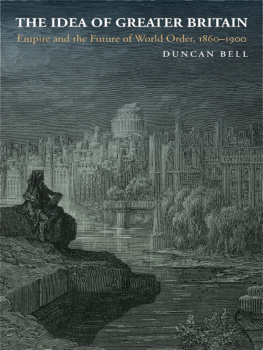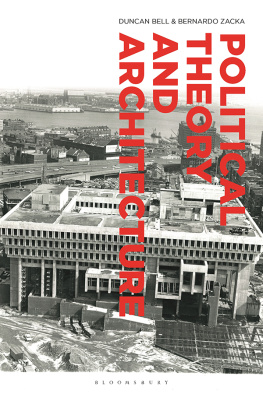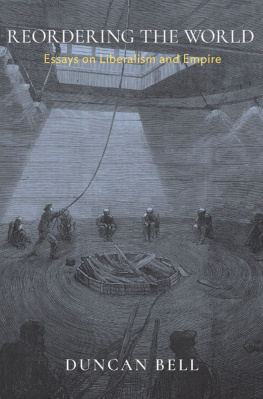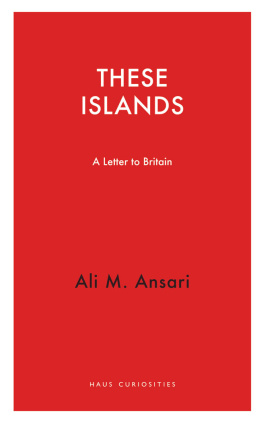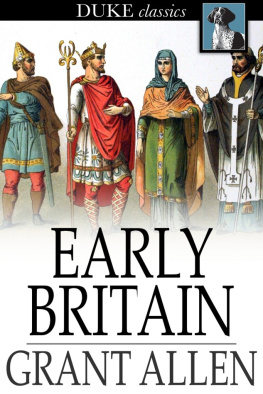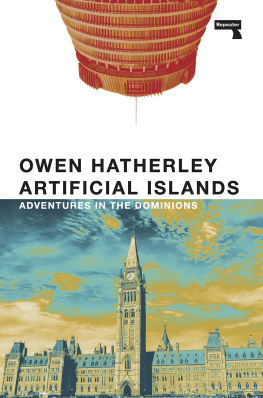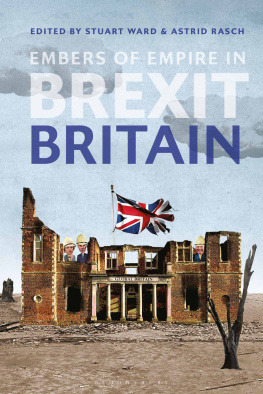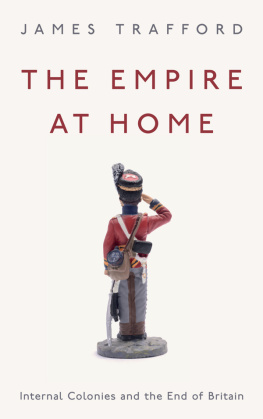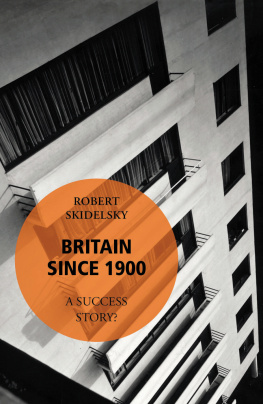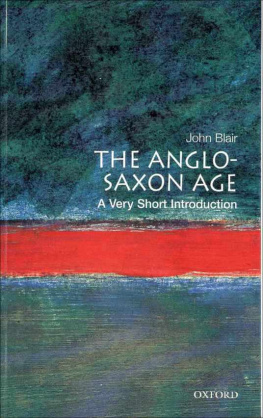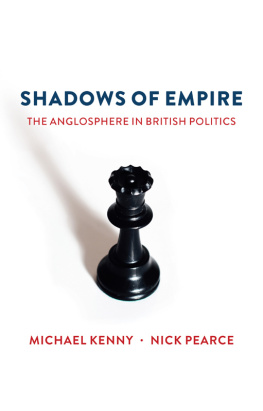The Idea of Greater Britain
The Idea of
Greater Britain
Empire and the Future of World Order, 18601900
Duncan Bell
PRINCETON UNIVERSITY PRESS
PRINCETON AND OXFORD
Copyright 2007 by Princeton University Press
Published by Princeton University Press,
41 William Street, Princeton, New Jersey 08540
In the United Kingdom: Princeton University Press,
3 Market Place, Woodstock, Oxfordshire OX20 1SY
All Rights Reserved
Library of Congress Cataloging-in-Publication Data
Bell, Duncan, 1976
The idea of greater Britain : empire and the future
of world order, 18601900 / Duncan Bell.
p. cm.
Includes bibliographical references and index.
eISBN: 978-1-40082-797-8
1. Great BritainColoniesHistory19th century.
2. ImperialismHistory19th century. 3. National
characteristics, British. 4. Great BritainCivilization
19th century. I. Title.
DA16.B38 2007
909'.0971241081dc22
2007002911
British Library Cataloging-in-Publication Data is available
This book has been composed in Sabon
Printed on acid-free paper.
press.princeton.edu
Printed in the United States of America
1 3 5 7 9 5 8 6 4 2
This book is dedicated to the memory
of my father, Charles Julian Bell,
and my grandfather, Alexander Bruce.
The old colonial system is gone. But in its place no clear and reasoned system has been adopted. The wrong theory is given up, but what is the right theory? There is only one alternative. If the colonies are not, in the old phrase, possessions of England, then they must be part of England; and we must adopt this view in earnest.
J. R. Seeley, The Expansion of England:
Two Courses of Lectures (1883)
Holding, as we must, that any reasonable security for good order and civilisation in the world implies the growing application of the federation principle in international politics, it will appear only natural that the earlier steps in such a process should take the form of unions of States most closely related by ties of common blood, language, and institutions, and that a phase of federated Britain or Anglo-Saxondom, Pan-Teutonism, Pan-Slavism, and Pan-Latinism might supervene upon the phase already reached. There is perhaps a suspicion of excessive logic in such an order of events, but a broad general view of history renders it plausible and desirable enough. Christendom thus laid out in a few great federal empires, each with a retinue of uncivilised dependencies, seems to me the most legitimate development of present tendencies and one which would offer the best hope of permanent peace on an assured basis of inter-Imperialism.
J. A. Hobson, Imperialism: A Study (1902)
The essence of empire is control. To control, whether of oneself or of others, everyone must bring a philosophy.
A. P. Thornton, Doctrines of Imperialism (1965)
Contents
Acknowledgments
WRITING THIS BOOK would have been impossible without a great deal of support, and I would like to thank those who have facilitated and enriched the process. Firstly, a number of institutions have aided me financially. The Arts and Humanities Research Board funded the doctoral research on which this book is based, while the Fulbright Commission supported a year in the Department of Political Science at Columbia University. Colleagues in the Centre of International Studies, and in the Faculty of History, University of Cambridge, have helped to create intellectually vibrant environments in which to work, as well as offering excellent advice at key points. I would also like to thank the support staff (in particular Wendy Cooke) for all their help over the last five years. Jesus College provided a comfortable home for the early stages of the project. Finally, it is a great honor to have been elected to a Junior Research Fellowship at Christs College. The college provides a beautiful environment in which to work, and I would like to thank the late Master (Malcolm Bowie), the current Master (Frank Kelly), the Fellows, and the staff, for their kind and generous welcome.
In my own experience academic research is a highly social activity, anchored in regular interaction with teachers and friends (often one and the same), and without them this project would probably never have started, let alone reached some sort of conclusion. I would especially like to thank Charles Jones, for his patient and erudite supervision of an ever mutating project, and Istvan Hont, for his brilliant scholarly guidance as well as for his steadfast support. My movement back and forth between international relations and the fresh pastures of intellectual history has been made much easier by both of them. Alan Bell, Peter Mandler, and Marc Stears have read all (or most) of the manuscript, and I am very grateful for their probing commentaries as well as their admirable endurance. Casper Sylvest has read it two or three times; his counsel has been consistently illuminating, and his own work on liberal internationalism has helped me to formulate and refine many of my own arguments. At the last minute Ged Martin provided pellucid comments on several chapters. Peter Cain has helped in navigating the choppy waters of Victorian imperialism. My doctoral thesis examiners, Richard Tuck and David Can-nadine, offered some very useful suggestions for improving the text, and their kind assistance and subsequent encouragement is much appreciated. Michael Freeden, Quentin Skinner, and Gareth Stedman Jones, have all offered inspiration, as well as tremendously helpful advice, for my work on the history of political thought, and this project owes much to their own scholarly endeavours. I would also like to thank the following for their constructive comments on one (or more) chapters: David Armitage, Jens Bartelson, Michael Bentley, Antoinette Burton, Linda Colley, Stephen Constantine, Daniel Deudney, Heather Ellis, Zeev Emmerich, James Ep-stein, Sarah Fine, Matthew Grimley, Ian Hall, Joel Isaac, Stuart Jones, Duncan Kelly, Oswyn Murray, Karuna Mantena, Jeanne Morefield, Jeremy Morris, Maria Neophytou, Karen OBrien, Jon Parry, Susan Pedersen, Jennifer Pitts, Simon Potter, David Reynolds, Julia Stapleton, John Thompson, David Worsley, and Brian Young. Finally, various friends and colleagues provided excellent advice, and I would like to thank them also: Tarak Barkawi, Mike Boyle, William Burke-White, John Burrow, Stefan Collini, Susanna di Feliciantonio, Inbali Iserles, Zaheer Kazmi, Martin ONeill, Emma Rothschild, Andrea Sangiovanni, Mette Eilstrup-Sangiovanni, and Ricardo Soares de Oliveira. None of the above can be held responsible for any remaining scholarly infelicities. It has been a pleasure to work with Ian Malcolm, a brilliant editor.
I have benefited greatly from the comments and questions of audiences at seminars and conferences, including those at the British Academy; Institute for Historical Research; Cambridge; Oxford; Warwick; Pomona College; the University of California, Berkeley; Columbia, Sheffield Hal-lam; the International Studies Association annual conventions in Honolulu (2005) and San Diego (2006), as well as the American Political Science Association annual convention in Washington, D.C. (2005). Various portions of the book have appeared in print, sometimes in rather different forms. Elements of chapter 4 can be found in The Victorian Idea of a Global State in Duncan Bell (ed.), Victorian Visions of Global Order: Empireand International Relations in Nineteenth-Century Political Thought (Cambridge University Press, 2007). Some of the material from chapter 6 was published in Unity and Difference: J. R. Seeley and the Political Theology of International Relations,
Next page
